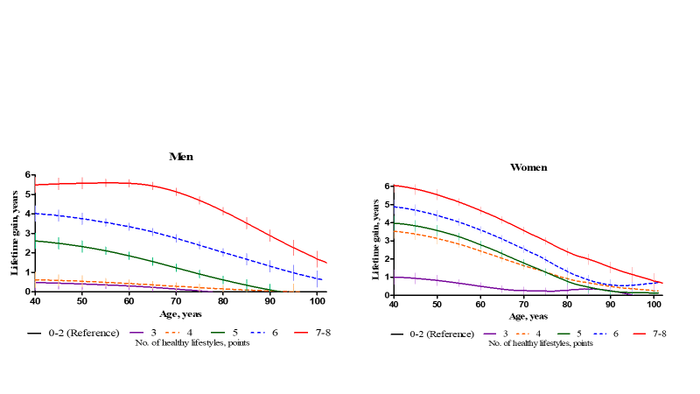Osaka, Japan – Idioms and proverbs about the importance of maintaining good health span the ages. Many emphasize how closely health is tied to happiness and the opportunity to live a fulfilling and enjoyable life. A study published this month in Age and Ageing by The Japan Collaborate Cohort (JACC) Study group at Osaka University assessed the impact of modifying lifestyle behaviors on life expectancy from middle age onwards. The researchers found that adopting five or more healthy lifestyle behaviors increased life expectancy even for individuals >80 years of age and, importantly, including those with chronic conditions.

Credit: 2022 R.Sakaniwa et al. Impact of modifiable healthy lifestyle adoption on lifetime gain from middle to older age. Age and Ageing
Osaka, Japan – Idioms and proverbs about the importance of maintaining good health span the ages. Many emphasize how closely health is tied to happiness and the opportunity to live a fulfilling and enjoyable life. A study published this month in Age and Ageing by The Japan Collaborate Cohort (JACC) Study group at Osaka University assessed the impact of modifying lifestyle behaviors on life expectancy from middle age onwards. The researchers found that adopting five or more healthy lifestyle behaviors increased life expectancy even for individuals >80 years of age and, importantly, including those with chronic conditions.
Lifespan is dependent on social factors such as socioeconomic status, policy factors such as assisted access to healthcare, and lifestyle factors like diet and exercise. The current study used a baseline survey from the JACC study, a large research project of 49,021 individuals conducted from 1988 to1990 in 45 areas of Japan. The aim was to increase knowledge about what factors contribute to death from cancer and cardiovascular disease; thus, the questionnaire included components such as diet, exercise, alcohol intake, smoking status, sleep duration, and body mass index. Points were given for each healthy behavior and the impact of modifying these lifestyle behaviors on projected lifespan was assessed.
The study continued until December 2009, by which time 8,966 individuals had died. The study’s primary author, Dr. Ryoto Sakaniwa said. “The results were very clear. A higher number of modified healthy behaviors was directly associated with great longevity for both men and women.” The lifetime gains were highest for reducing alcohol intake, not smoking, losing weight, and increasing sleep, adding up to 6 years of life for healthy 40-year-olds.
This benefit was prominent even among older individuals (80 years or more) and those with one or more major comorbidities including cancer, cardiovascular disease, hypertension, diabetes, and kidney disease, and in each life stage from middle age onwards. “This is a particularly important finding given that the prevalence of chronic disease has increased globally and is a major cause of death in older populations,” says Senior author, Prof. Hiroyasu Iso. This is one of the first studies to measure the impact of improvements to health behavior among older individuals in a country with a national life expectancy achieving almost 85 years.
The finding that lifestyle improvements has a positive impact on health despite chronic health conditions and older age is an empowering one, especially given the increasing prevalence of chronic conditions and longer life. The findings of this study will contribute to the design of future healthcare settings, public health approaches, and policies that work in partnership with patients to promote healthy lifestyle choices.
###
The article, “Impact of modifiable healthy lifestyle adoption on lifetime gain from middle to older age” was published in Age and Ageing at DOI: https://doi.org/10.1093/ageing/afac080
About Osaka University
Osaka University was founded in 1931 as one of the seven imperial universities of Japan and is now one of Japan’s leading comprehensive universities with a broad disciplinary spectrum. This strength is coupled with a singular drive for innovation that extends throughout the scientific process, from fundamental research to the creation of applied technology with positive economic impacts. Its commitment to innovation has been recognized in Japan and around the world, being named Japan’s most innovative university in 2015 (Reuters 2015 Top 100) and one of the most innovative institutions in the world in 2017 (Innovative Universities and the Nature Index Innovation 2017). Now, Osaka University is leveraging its role as a Designated National University Corporation selected by the Ministry of Education, Culture, Sports, Science and Technology to contribute to innovation for human welfare, sustainable development of society, and social transformation.
Website: https://resou.osaka-u.ac.jp/en
Journal
Age and Ageing
DOI
10.1093/ageing/afac080
Method of Research
Observational study
Subject of Research
People
Article Title
Impact of modifiable healthy lifestyle adoption on lifetime gain from middle to older age
Article Publication Date
11-May-2022




